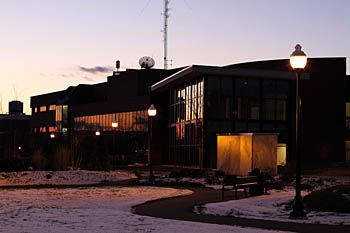Everyone can help cut down on campus electric use
Everyone can help cut down on campus electric use
From July 2010 through February 2011, BU electric use on the upper and lower campus equaled 14,633,021 kilowatt hours costing $1.2 million. Reducing electric use lowers the operating costs associated with educating students at BU.
In addition, saving electricity also reduces the amount of carbon dioxide and other pollutants entering the atmosphere and saves our-non-renewable resources for future generations. All faculty, staff and students can play an active part in BU's energy conservation. The accumulative effect of simple acts like turning off your office lights when not in use can have a significant impact.
Steps to Reduce Electric Costs
All BU faculty, staff and students must take an active part in reducing energy costs. The following are just some of these recommended practices:
- Lights — Lighting typically consumes 40% of the energy used in an office area. Turn off lights when not in use.
- Computers — It is recommended to turn your computer off before you leave the office for the day. It is reported that turning your computer off each night can save $75 each year per computer. To automatically shut down your computer each night consider plugging office equipment into an occupancy sensor power strip. You can also make sure that your computer’s power management features are enabled. Consider having someone from tech support services check/activate the energy management features for all of the computers in your office. Check with the IT office before turning computers off to make sure you aren’t preventing the IT office from providing required updates or other services.
- Monitors — It is recommended that you turn off your monitor before you leave your office for the day. Even when in the screen saving mode the monitor requires electricity. Replace standard computer monitors with LED screens. LED screens reportedly use 90 percent less energy than standard monitors. Don’t buy large monitors unless they are needed for work activities. A 17” monitor uses 35 percent more power than a 14” monitor.
- Printers — Turn off printers when not in use. Ink Jet printers reportedly use 90% less energy than laser printers.
- Copiers — Copiers may be one of the highest energy consumers in your office. Turn off copiers when not in use. Make sure that power management features are activated.
- Electric Space Heaters — Residence Life prohibits the use of Space Heaters in residence halls. For all other buildings please consider not using electric space heaters. Electric space heaters in offices and classrooms pose a safety risk as well as negatively affect the operation of existing building heating, ventilation and air conditioning systems.
- Other Electric Appliances — Please consider the effect of refrigerators, coffee makers and other appliances on the overall electric bills here at BU. #BUSustainability

